
Paul Brand 3pm - 6pm
18 February 2021, 18:40

Covid-19 case rates are continuing to fall in all regions of England, new data shows, as the number of people vaccinated across the UK nears 17 million.
The number of cases across the country has shrunk, with new infections also dropping across all age groups.
The new data came as the number of vaccines almost reached 17 million.
Read more: Spain and USA could be next countries on quarantine 'red list'
Earlier on Thursday, Labour leader Sir Keir Starmer accused the Government of offering a "roadmap to yesterday" in a speech setting out the party's long-term economic vision.
In a virtual keynote speech, he warned that the Chancellor must avoid delivering a Budget on March 3 that would contain little more than short term fixes.

Care minister wants to allow people to hold hands with relatives
16,996,806 jabs have been given in the UK so far, with 16,423,082 first doses - a rise of 482,110 on the previous day - and 573,724 second doses - an increase of 15,147 on figures released the previous day.
According to the latest weekly surveillance report from Public Health England, in the East Midlands, the rate of new cases stood at 176.7 per 100,000 people in the seven days to February 14 - the highest rate of any region, but down from 228.4 in the previous week.
The West Midlands recorded the second highest rate: 170.4, down from 243.1.
South-west England recorded the lowest rate: 87.4, down from 123.1.
Case rates in England are also continuing to fall among all age groups, Public Health England said.
The highest rate is among 30 to 39-year-olds, which stood at 192.5 cases per 100,000 people in the seven days to February 14, down week-on-week from 270.8.
Among 20 to 29-year-olds the rate dropped from 253.2 to 173.4, and for 40 to 49-year-olds it fell from 232.2 to 162.9.
For people aged 80 and over, the rate fell from 208.0 to 129.6.

Sadiq Khan: 'If it were me bus drivers and officers would be vaccinated by now'
A further 454 people had died within 28 days of testing positive for Covid-19 as of Thursday, bringing the UK total to 119,387.
The Government also said that, as of 9am on Thursday, there had been a further 12,057 lab-confirmed cases of coronavirus in the UK.
It brings the total in the UK to 4,083,242.
The latest figures came as more surge testing is being introduced after a further discovery of the South African variant of Covid-19 in Leeds.
People in the LS8 postcode, including parts of Harehills and the area just north of Easterly Road where the variant was found, are being "strongly encouraged" to take a test when offered, whether or not they have symptoms.
Earlier this week the department said targeted testing regimes would be set up in parts of Norfolk, Southampton and Woking in Surrey.
Efforts in Manchester to track down examples of the more transmissible Kent variant were also being expanded following deployment of testing teams last week.

Sociologist on vaccinated 'returning to normal'
A spokeswoman for the department said: "Extra testing is being introduced in addition to existing extensive testing, and in combination with following the current lockdown rules and remembering Hands Face Space advice, will help to monitor and suppress the spread of the virus.
"Positive cases will be sequenced for genomic data to help understand Covid-19 variants and their spread within these areas."
Public Health England has said sequencing of positive PCR tests - swabs that are processed in a laboratory - can take around two weeks.
A DH spokeswoman said data from areas where surge testing has been completed or is nearing completion is "due to be provided in due course".
The latest figures show 1,295,051 PCR tests were conducted in England in the week to February 10.
At the same time there has been a huge spike in the number of rapid turnaround lateral flow device (LFD) tests.
A record 2,400,724 LFD tests were conducted in England in the week to February 10, according to the latest NHS Test and Trace figures.
It is the second successive week in which more LFD tests were conducted than PCR tests.
The rapid tests give results in 30 minutes or less without the need for processing in a laboratory, and are being used as a fast way to test people who do not have symptoms.
Around one in three people with the virus do not display symptoms and the Government has described lateral flow tests as "ideal for widespread use in the community".